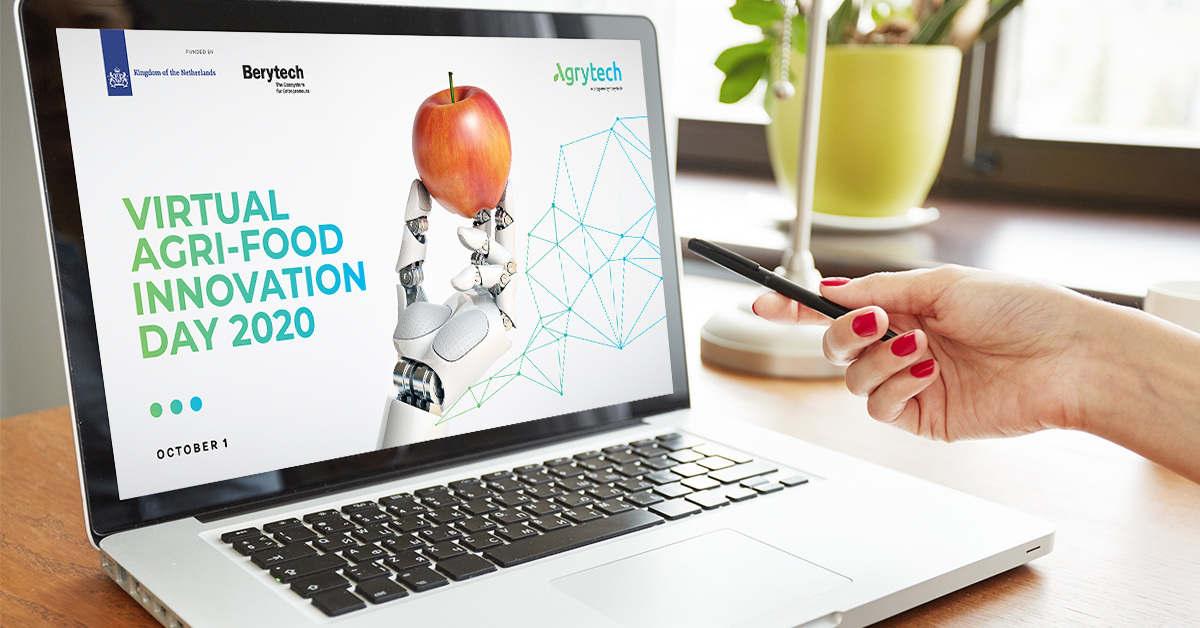
Berytech, with the support of the Embassy of the Kingdom of The Netherlands in Lebanon, organized the second edition of the Agri-Food Innovation Day (AFID) with more than 1000 people signing up for the virtual event including entrepreneurs, engineers, innovators, investors, agri-food sector players and professionals, as well as post-graduate students, academics and researchers.
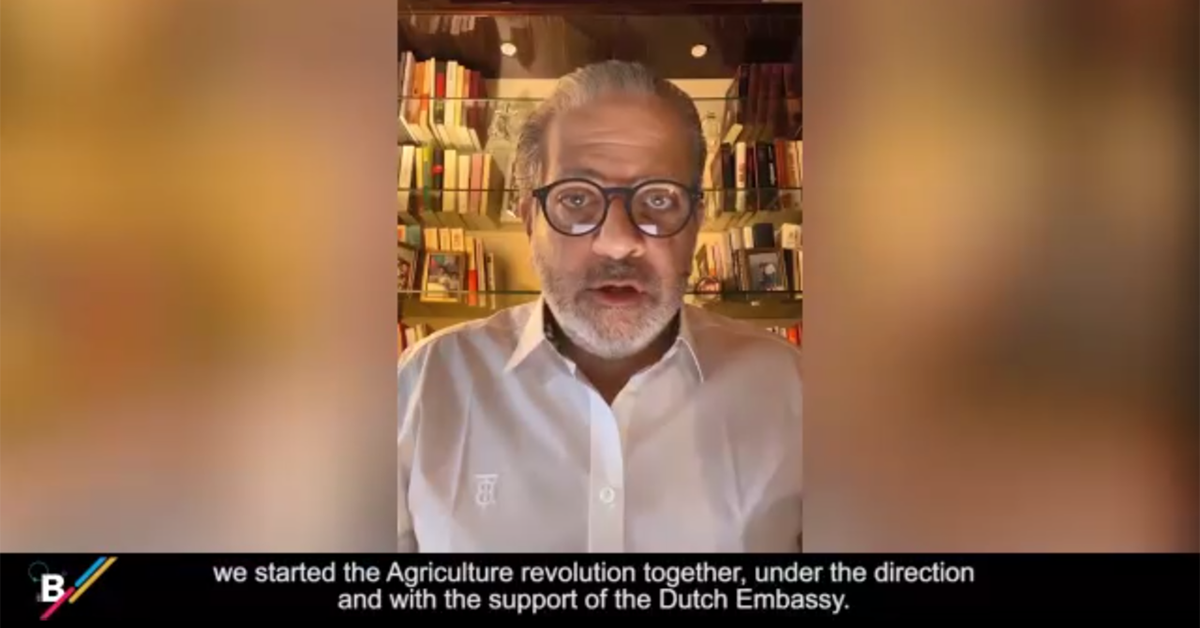
In his opening notes, Berytech’s Chairman and CEO Maroun N. Chammas, commented: “Last year, I spoke of agriculture being a national matter, and how Lebanon can play a role in the food security of the region, given the microclimates it has, as well as its human capital and entrepreneurship mindset. This is still my firm belief.”
Berytech, with the support of the Dutch Embassy in Lebanon, had launched the ACT Smart Innovation Hub initiative at the beginning of the year, aimed at strengthening business advancement, economic growth and job creation in the Agri-food and Cleantech sectors in Lebanon. “Today, and during this second edition of the Agri-Food Innovation Day, we are discussing the future of the agri-food sector and how innovation and sustainability can become the premise for its growth, as well as cluster driven circular economy, and whether the financial crisis will reinforce the implementation of circular economy principles, as well as the role of clusters in catalyzing it.”
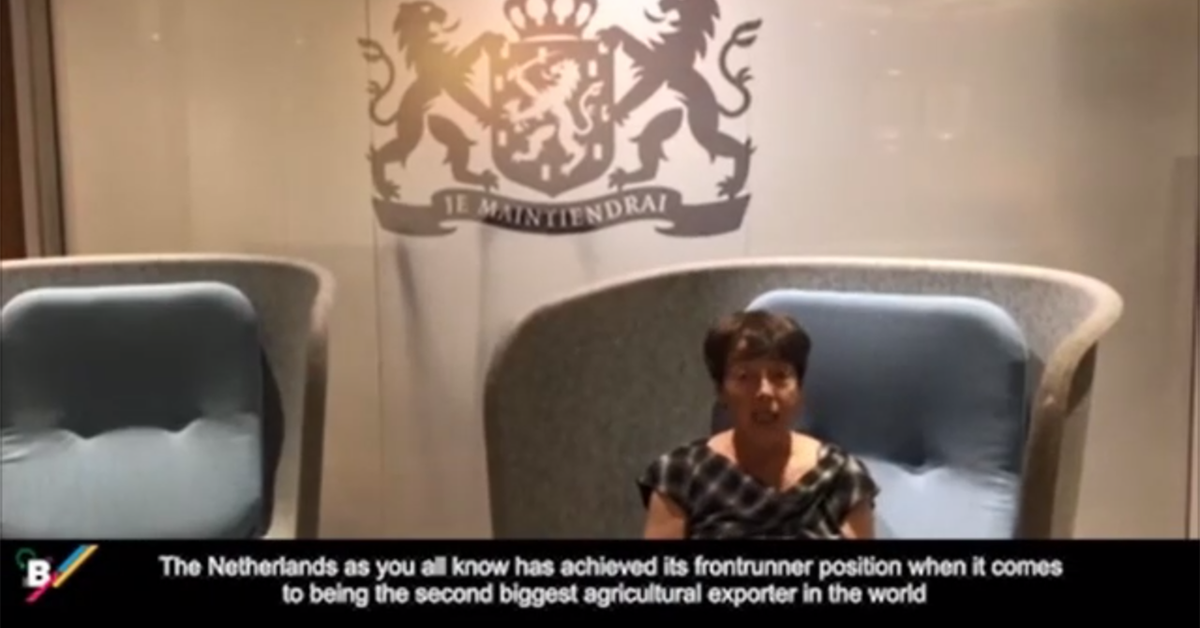
In her part, H.E. Frederique de Man, Ambassador of the Kingdom of The Netherlands in Lebanon, confirmed that, “The work with Berytech on the Agrytech program fits in really well with our Embassy’s priority areas with 87% of the participants being below 35 years old and 41% women that were supported in the third batch. It is important to support youth in gaining a better perspective for their future and building their own future, through innovation support, entrepreneurship and SME support. Despite all challenges, the program succeeded in supporting 18 startups including 51 participants.”
Agri-Food Revolution
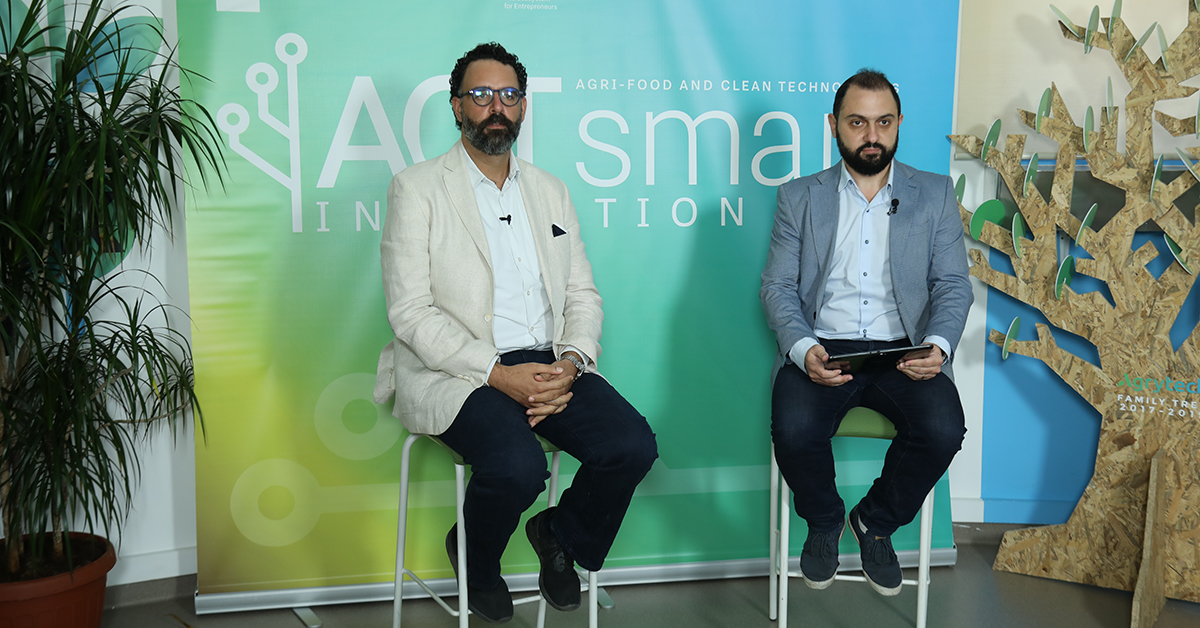
The Agri-Food Innovation Day was moderated by Salah Awad – Deputy Director of the ACT Smart Innovation Hub Initiative. He encouraged the viewers to work on challenges in the agri-food sector and to change them into opportunities. “Today we are bringing a message of hope, because hope will let us fight forward for a better future.”
During his intervention, Ramy Boujawdeh – Deputy GM of Berytech confirmed that The Agri-food Innovation Day was an important one for Lebanon and for the region. The virtual event was a platform to discuss agriculture and agri-food innovations that are crucial to improving the sector, to creating jobs, to creating stability and ensuring that the job is done right. “Our region is suffering from a lot of instability and food security is a big concern, as climate change is affecting it.”
He continued, “We need to focus on sustainability, on ensuring that we increase our food production through the use of technology, innovation and mechanisms that can save water, use renewable energy to ensure our production of food is done in a smart manner that would feed our population, and to make sure that everybody in the MENA is able to access healthy and nutritious food.”
Watch the first part of the interventions here.
Keynote Speaker

Keynote speaker Aline Bsaibes told the story of her inspirational journey of becoming the CEO of ITK, after entering as an agronomic modeler with a thesis in mathematics applied to agriculture. She became project manager in this startup, which designs decision support software for farmers and breeders: crop forecasting, land productivity according to crops, input management, animal health, etc.
For the company, which has just raised 8 million euros, Bsaibes has also conquered market share in the United States, Brazil, China, and in Europe.
Bsaibes also talked about transforming the agri-food sector to achieve food security needs by moving to sustainable practices based on science and technology.
Panel Discussions
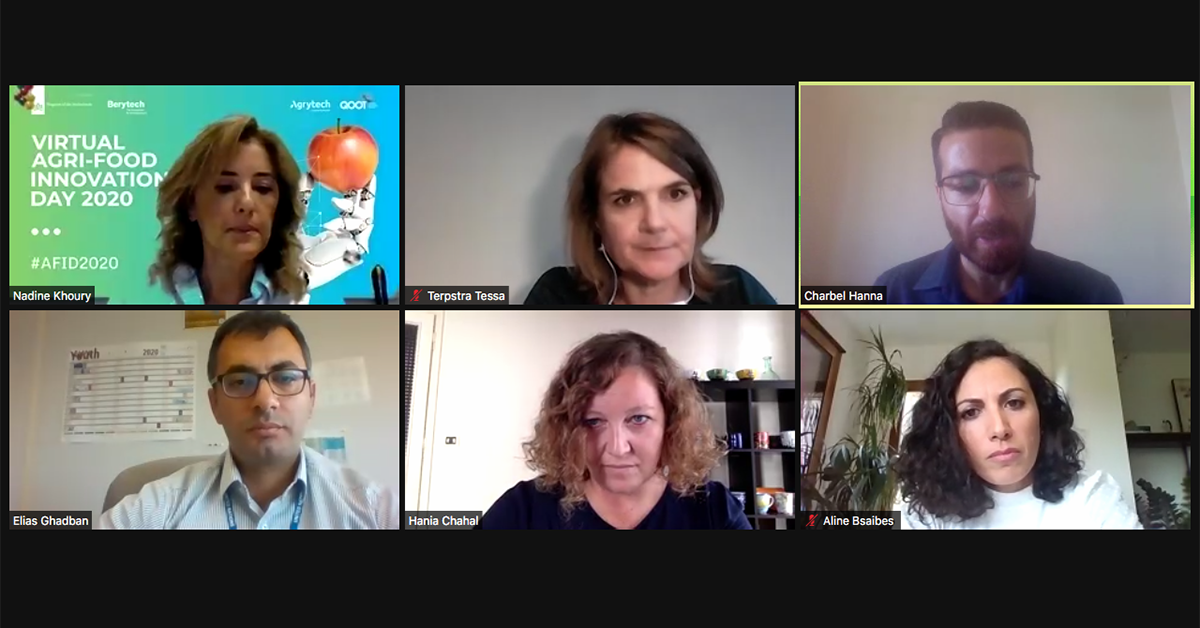
Berytech hosted 2 panel discussions during the virtual event, the first focused on local and regional challenges with Tessa Terpstra – the first Dutch Envoy for Water and Energy Security for the MENA region, Elias Ghadban – Regional Advisor for Food Security Issues at ESCWA, Hania Chahal – Marketing Economist, Charbel Hanna – Program Management and Technical Specialist at USAID, and moderated by Nadine Khoury – COO of Robinson Agri and President of QOOT Cluster. Panelists discussed the future of the agri-food sector and the role of innovation and sustainability in its growth.
Ghadban exposed the fragility of the agri-food system in the Arab world citing how the region is import-dependent, with 80% of its food imported, costing 4% of its GDP.
Terpstra explained how the Dutch government is active in the Middle East to make agriculture production more efficient while working in a sustainable way with rising water scarcity due to climate change.
Hanna introduced the water management projects under the portfolio of USAID in the region focusing on the use of new technologies, recycling and re-using water in agricultural processing as the organization introduced many water treatment solutions to SMEs after identifying the present gaps.
To that, Chahhal mentioned how sometimes people do not have what it takes to adopt the technology that is being proposed. She pointed that innovation needs early adopters to influence its spread, while imported technology should be adapted to local needs.
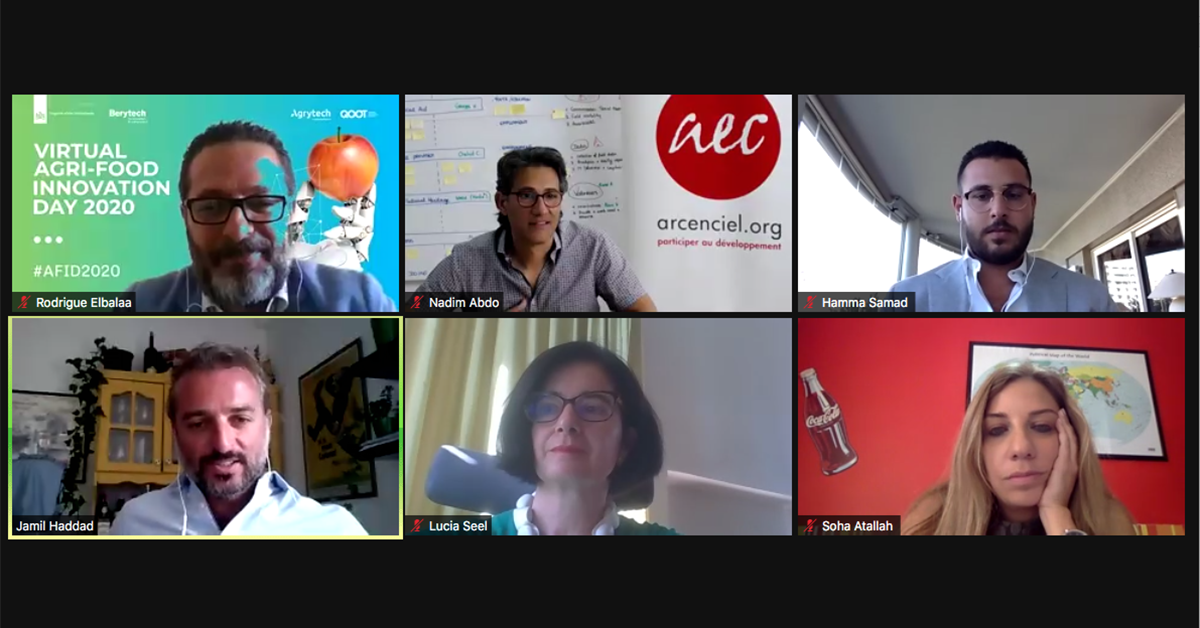
The second panel focused on cluster-driven circular economy with Nadim Abdo – Programs Director at arcenciel, Lucia Seel – Member of European Cluster Expert Group of the European Commission, Soha Atallah – Founder of Libanpack, Hammam Samad – Executive Manager at Lama Foods, Jamil Haddad – Founder of Colonel Brewery, and moderated by Dr. Rodrigue Balaa – Chairperson of the Department of Agricultural Engineering at Balamand University. The panel addressed the role of clusters in implementing the principles of circular economy in recovering from the dilapidations of the economic crisis and pandemic.
Seel assured that clusters can support their members to embrace activities of circular economy. They are able to do so based on the trust they have established among cluster members, also because they understand the needs of SMEs and the value chains that are crucial to them.
In his intervention, Abdo gave an example of how arcenciel uses the concepts of circular economy by explaining that they produce most of the cow feed they need in their farmland to reduce dependency on imports. Whatever organic waste comes out of the cow farm is then processed into fertilizer that goes back into the farmland.
Attalah explained how through her packaging consultancy service, she advises SMEs on designing sustainable packaging, not only environmentally friendly but also one that is crucial to limit food waste.
From his perspective, Haddad highlighted that Lebanon’s crisis is an opportunity to stir the county in the right direction in a sustainable way by changing the way we operate, produce and sell. His brewery has taken several circular measures to survive the crisis, including reducing its reliance on imported bottles by offering the alcohol at half price for clients who bring their own bottles to refill.
Samad detailed his company’s efforts to channel export waste into local production citing as examples producing grape derivatives, drying nuts and also taking the direction of social impact by offering excess products directly to those in need.
Agrytech Startup Demo
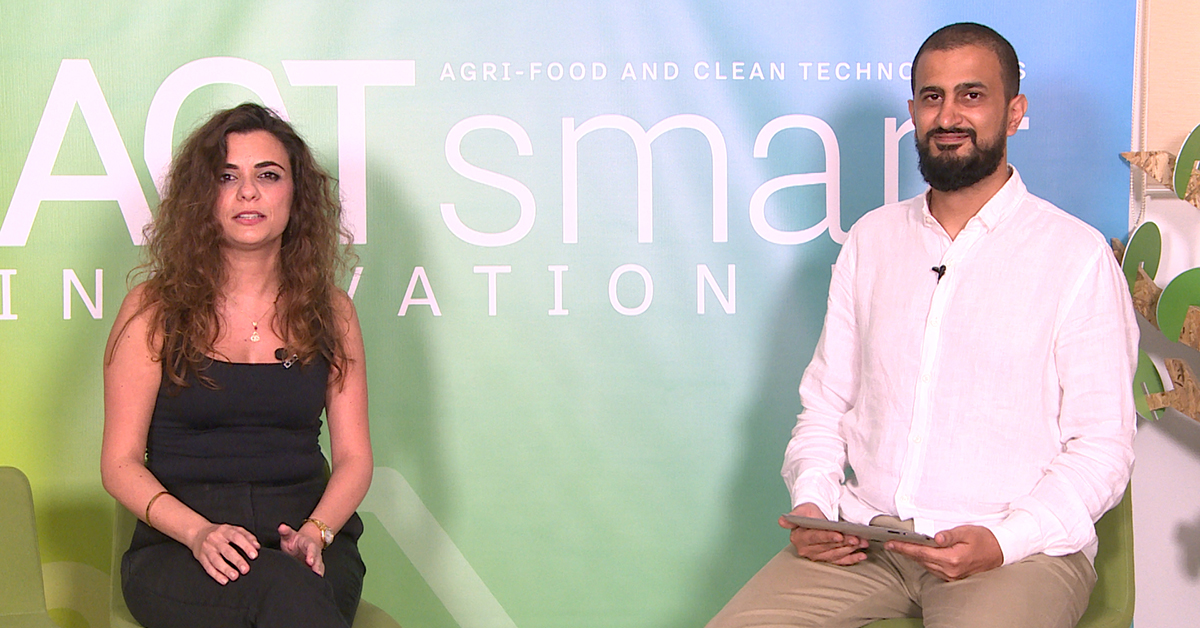
The Pitching Session had eight startups from the Agrytech Accelerator Program demonstrate their solutions for the first time to the public. The startups have been working hard for the last year to develop their solutions solving agri-food challenges across the entire value chain, using science and technology, with the plan to scale internationally.
The teams were introduced by Berytech’s Mario Ramadan – Accelerator Program Manager, and Joelle Atallah– Investment Specialist, who have worked with them from the day they enrolled in the Agrytech Program.
The team at MezzMix makes Lebanese sauces and condiments more accessible and easier to consume. They have created a garlic dip that does not contain dairy, mayo or eggs sold in a squeezable bottle with a longer shelf life.
The team at Luxeed Robotics is building a robot that uses laser to kill more than 85% of weed, with high precision, to prevent crop losses caused by traditional solutions.
TheBeeHaus offers the technology for beekeepers to monitor their apiaries, manage their business and optimize their honey production.
Food Sight is an online platform connecting food manufacturers with freelance experts in the food industry who are ready to tackle challenges in food safety, food quality, and export-readiness.
The team at Smart Land created an auto-controlled irrigation and fertigation system to help farmers maximize their profits and reduce costs.
Karya is a platform that connects people to memorable rural experiences linking hosts to users. The user can search for an experience, request a booking and pay online.
Ground Vertical Farming is a complete vertical farming solution that includes fully automated vertical panels, growing mediums, seeds and fertilizers, in addition to a main controller.
Fxbar is a range of healthy, on-the-go energy snacks that are nutritious and 100% natural containing ingredients like bee pollen and natural honey.
Networking Platform
In parallel to ongoing activities, the AFID2020 Networking Platform was open to connecting like-minded professionals, startup founders, investors, researchers, and post-graduate students. Through the platform, valuable introductions were made, innovative ideas were shared, professional discussions and industry talk were had.
ACT Smart Innovation Hub
The Virtual Agri-Food Innovation Day 2020 was organized under the ACT Smart Innovation Hub initiative by Berytech and co-funded by the Kingdom of The Netherlands, aimed at strengthening business advancement, economic growth and job creation in the Agri-food and Cleantech sectors in Lebanon.
The ACT Smart Innovation Hub initiatives runs over 36 months from September 2019 to August 2022. It includes two accelerator programs – Agrytech and Cleanergy, it aims to create 200 direct job opportunities and 400 indirect job opportunities with at least 50% linked to youth and 25% linked to women.
Through the innovation hub, Berytech continues its support of the QOOT Agri-Food Innovation Cluster, accompanying its members in their innovation strategies and competitiveness, ultimately leading to efficiency and quality exports from Lebanon.
Berytech is also working closely with Academia and research institutes on converting Intellectual Property (IP) into commercialized solutions. Berytech is also proposing policy reforms and establishing lobbying and coordination structures that will last beyond the lifetime of the initiative. All the above will be done using local Lebanese and Dutch know-how and expertise throughout the process.
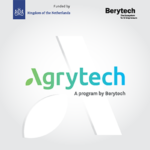 Agrytech Accelerator Program
Agrytech Accelerator Program
Berytech is sourcing the next agri-food innovators to help them grow their idea into a successful business with global impact. If you’re innovating in agriculture or food, join the fourth batch of the Agrytech Program and get up to $100k in funding and support to scale your business to success within 1 year. Learn more here.







